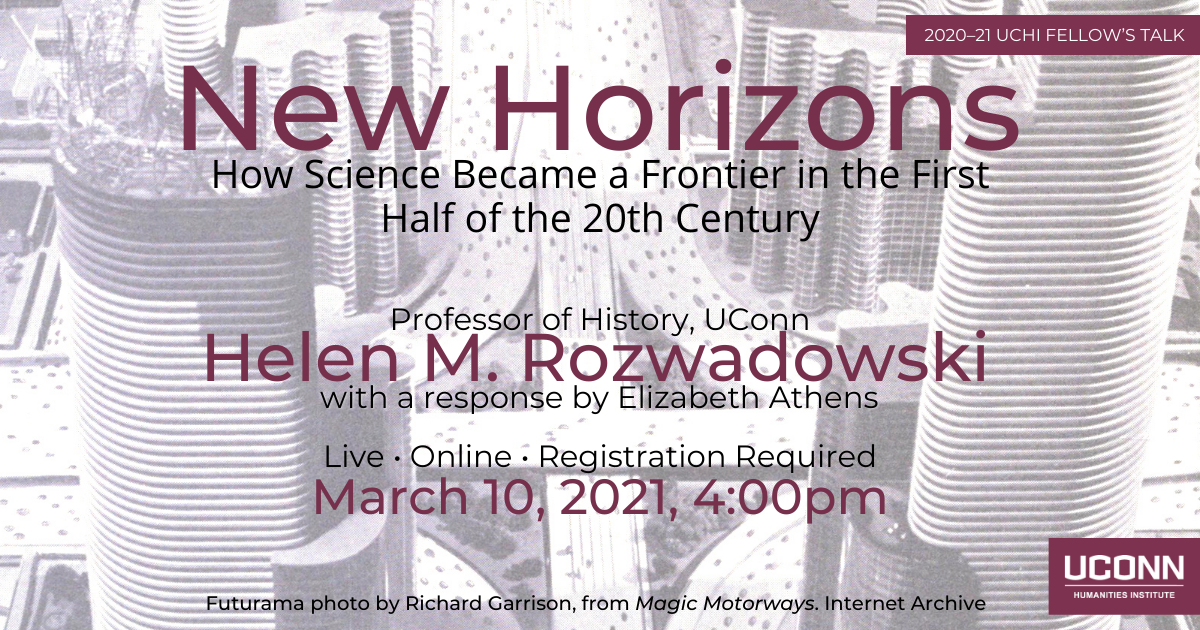New Horizons: How Science Became a Frontier in the First Half of the 20th Century
Helen M. Rozwadowski (Professor of History, UConn)
with a response by Elizabeth Athens
Wednesday, March 10, 2021, 4:00pm (Online—Register here)
Most people, certainly most Americans, have a ready set of associations for the word “frontier,” including Disney’s Frontierland, 1950s western films, the borderlands of Mexico and the United States, or outer space. Over the first half of the twentieth century, science and technology also became frontiers. Scientists, boosters, popular writers, and public intellectuals seized upon the US historian Frederick Jackson Turner’s formulation of the frontier of the American West (The Frontier in American History, 1920) and transformed a term of geography into one that stood for progress. They integrated Turner’s frontier with a thread of European internationalist thinking about frontiers and applied this novel concept to the natural sciences. Science would fuel economic growth, provide an outlet for the restlessness of American individualism, and ensure democracy and national progress. The ideological flexibility of frontier proved valuable for commentators who rendered science into a frontier that appeared to promise endless progress purportedly without the violence and exploitation of its namesake US western frontier.
Founder of the University of Connecticut’s Maritime Studies program, Helen M. Rozwadowski teaches history of science and environmental history as well as interdisciplinary and experiential maritime-related courses. She has spent her career encouraging scholars and students to join in writing the history of interconnections between oceans and people. Her book on the 19th-century scientific and cultural discovery of the depths, Fathoming the Ocean: The Discovery and Exploration of the Deep Sea, won the History of Science Society’s Davis Prize for best book directed to a wide public audience. In The Sea Knows No Boundaries she explores the history of 20th-century marine sciences that support international fisheries and marine environmental management. Recently she has co-edited Soundings and Crossings: Doing Science at Sea 1800-1970, one of several volumes that have established the field of history of oceanography. Her recent book, Vast Expanses: A History of the Oceans (Reaktion Books, 2018), which won the Sharon Harris Book Award from UCHI in 2019, has come out in a Korean edition in 2019 and a Chinese edition in 2020.
Elizabeth Athens is Assistant Professor of Art History at the University of Connecticut, where she teaches courses on museum studies, histories of collecting, and material culture. She previously served as part of the research team for the History of Early American Landscape Design database at the Center for Advanced Study in the Visual Arts in Washington, D.C., and as the American art curator of the Worcester Art Museum. Her current research centers on the work of the American artist-naturalist William Bartram (1739–1823), whose efforts helped redirect the taxonomic focus of eighteenth-century natural history to the study of lived relationships. This project examines Bartram’s unusual graphic practice and how his natural history drawings helped articulate such a shift.
Registration is required for the event.
If you require accommodation to attend this event, please contact us at uchi@uconn.edu or by phone (860) 486-9057.


